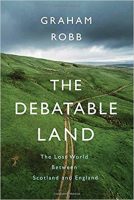The Debatable Land: The Lost World Between Scotland and England
by Graham Robb
(Picador, £20)
 Borders are proving fertile ground. They provided the subject not only for the Stanford Dolman Travel Book of the Year (Border by Kapka Kassabova, on the land where Greece, Turkey and Bulgaria run into one another) but also for one of the titles shortlisted for that award (Garrett Carr’s The Rule of the Land, about Ireland’s currently far-from-hard frontier). Those followed books in the past few years about the England-Scotland border by a series of writers, the latest being that latter-day Lawrence of Arabia Rory Stewart in The Marches.
Borders are proving fertile ground. They provided the subject not only for the Stanford Dolman Travel Book of the Year (Border by Kapka Kassabova, on the land where Greece, Turkey and Bulgaria run into one another) but also for one of the titles shortlisted for that award (Garrett Carr’s The Rule of the Land, about Ireland’s currently far-from-hard frontier). Those followed books in the past few years about the England-Scotland border by a series of writers, the latest being that latter-day Lawrence of Arabia Rory Stewart in The Marches.
Graham Robb is concerned with a territory that straddled borders; a place that was once neither Scottish nor English: the Debatable Land. This 50 square miles of boggy moorland, running north-east from the Solway Firth, has long been seen by historians as nothing more than a buffer zone between nations; the province of castle-rustling villains known as reivers. Under Henry VIII, Elizabeth I, James V and James VI, it was the bloodiest region in Britain. But it didn’t start that way. Robb argues that the Debatable Land has been both misidentified and misrepresented. Seen as a whole, its history is not a horrible one; it might, indeed, be a model one.
This is a book written as much on the road as in the library. Having cycled with his American wife (I’d like to have heard a little from her) around and across the Debatable Land, Robb then journeys on paper and 2,000 years into the past, using an atlas of Britain created by Ptolemy in the 2nd century AD. He establishes early that the Debatable Land was a place not of contention but of co-operation. It was first “batable” land — rich turf on which cattle could be pastured and fattened up (or “battened”). It was land that was shared, that transcended borders; land where it had long been agreed that no permanent settlement could be made. How long? Long before England or Scotland or the idea of either existed.
It wasn’t until the 1510s, and the invasion of reiving clans such as the Armstrongs and Grahams, that it became a place of conflict. The reivers, while they might effectively have been stateless, passing between Scotland and England as freely as an otter on the River Liddel, were far from lawless. Most took part in only one raid, which was something of a rite of passage. They usually returned or paid compensation for what they had stolen, the “berieved” having kept notes of all their losses, “as though for an insurance company”. Anyone who tried to dodge payment would be subjected to the shame of “bauchling” — ostracism.
Robb’s book is both a scholarly work of revisionism and a thoroughly entertaining read, given additional force by the fact that he was writing it in the run-up to two votes — on Scottish independence and on Britain’s membership of the European Union — in which nationalist feeling ran high. It’s one he seemed fated to write. He and his wife moved in 2010 from Oxford to Cumbria to be nearer his ailing Scottish mother and have more peace for cycling and writing. The river running through their border hermitage had once marked the southern boundary of the Debatable Land. The property had previously been owned by Nicholas Ridley, one of Margaret Thatcher’s closest supporters and a probable target of the IRA, who fought over another border, on the island of Ireland.
It’s a book for which Robb is qualified not only by his training as a historian but, you might say, by birth: he was born in Manchester to a Glaswegian mother; his Aberdonian forefathers had sailed from the Norse Lands, settling on farms they destroyed, and were “undeniably robbers” — or reivers. One of the pleasures of reading it is to watch the author, like a frontier-dodging reiver, slip so easily between past and present, between manuscript and moor, between battlefield site and the 127 bus (“a transnational village hall on wheels”).
He delights in ancient and local words such as lonning (a farm track) and drow (a thick Liddesdale mist). He’s good value, too, on Cumbrian forecasts, with their light rain giving way to prolonged showers: “The phrase ‘give way to’ is not quite accurate. The light rain will continue to fall while, from another section of the celestial orchestra, heavy drizzle joins in to the accompaniment of a thudding downpour, until the coincidence of precipitations creates a deafening deluge of unpredictable duration from which the earth will emerge, not refreshed, but beaten up and rearranged.” MK
A shorter version of this review appeared in The Daily Telegraph on March 3, 2018
